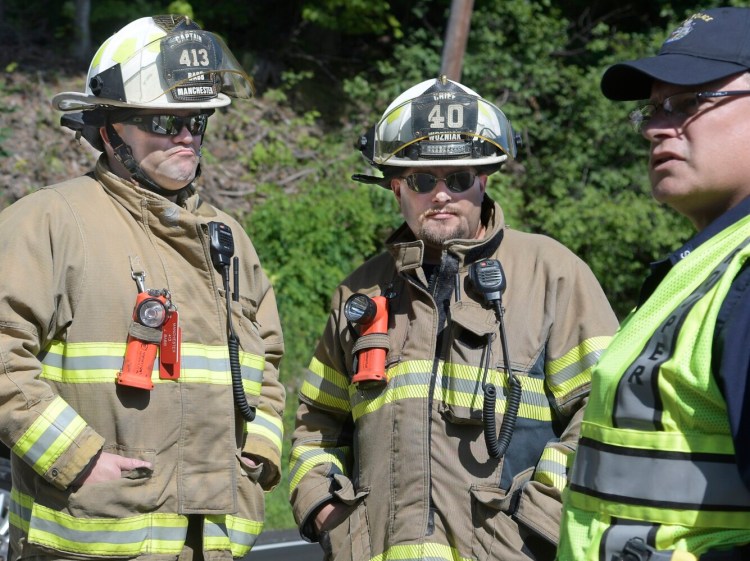MANCHESTER — Manchester Fire Chief Francis R. Wozniak pleaded guilty recently to operating under the influence under an agreement with prosecutors that would allow the charge to be dropped after a year of good behavior.
Wozniak, 39, was arrested in February of 2020 in Portland after police said the vehicle he was driving was observed operating at night without its headlights on. Wozniak was charged with operating under the influence following a traffic stop.
The complaint against Wozniak alleges a test he took that night showed a blood-alcohol level of .15 grams, nearly twice the state’s .08 legal limit.
Wozniak pleaded guilty last month to operating under the influence in a deferred disposition agreement with prosecutors, according to Cumberland County court documents.
If Wozniak complies with the terms of the agreement, the lone charge against him would be dismissed and he would have no OUI conviction on his record and he could never be sentenced for the crime.
Wozniak, known as Frank, did not return a call Monday seeking comment, instead referring questions to his lawyer, Darrick X. Banda. The defense lawyer said at the end of the deferment period, Wozniak would be allowed to withdraw his guilty plea and the charge would be dismissed.
Banda and town officials said Wozniak did not lose his driver’s license either to the courts or to the state Bureau of Motor Vehicles, which sometimes takes the driver’s licenses of those accused of operating under the influence even before they have gone to trial.
Banda and town officials expressed confidence the chief will comply with the terms of the deferred disposition agreement, will have the charge dismissed and will not have his driver’s license suspended due to the incident.
“This resolution was a compromise that balanced the interests of both sides of the case while also recognizing that we would likely have been able to exclude the breath-test result had the matter gone to trial,” Banda said Monday. “He has not lost his license. We prevailed at the administrated (Bureau of Motor Vehicle) hearing. Further, because there will be no conviction, there will be no court-ordered loss of license.”
Banda said he believed Wozniak’s breath test would have been excluded from trial due to record keeping issues involving the monthly calibration logs of the Cumberland County Sheriff’s Office, such that the state might not have been able to identify the correct witness for the test’s admission into evidence at trial.
Manchester Town Manager E. Patrick Gilbert said the town has pursued no disciplinary action against Wozniak related to the OUI charge.
Wozniak, who is the small Fire Department’s only full-time employee, has continued to drive the town’s fire trucks because he has remained licensed to do so, according to Gilbert.
“He’s still licensed. He’s still legally driving. He can drive a truck to a (fire) scene,” said Gilbert, who confirmed Wozniak had kept him and the town informed about his plea and deferred disposition agreement.
Gilbert declined to comment further, saying the issue is a personnel matter.
Selectman Bob Gasper, also a firefighter, declined to comment.
Wozniak’s position was made full time at the annual Town Meeting on June 13, 2019. In a 24-19 vote, residents approved a controversial proposal to make the fire chief’s job a full-time position, with an annual salary of $37,440.
The fire chief’s position in Manchester used to be a volunteer position, but in 2018 it became a paid, part-time, 20-hour-per-week position.
Gilbert said officials at the 2019 Town Meeting proposed to make the position full time because the number of people volunteering to be firefighters in Maine had been in rapid decline.
A check of Wozniak’s driving record with the Maine Bureau of Motor Vehicles showed he has an active driver’s license with an active commercial driver certification and a clean driving record going back at least 10 years, with no accidents and no convictions. The record specifically indicates he has not been convicted of OUI.
Banda said the statutory mandatory minimum license suspension for one convicted of an OUI charge does not apply to Wozniak because his guilty plea is not final until and unless he is sentenced, and that sentencing is deferred while he complies with the terms of the deferred disposition contract.
Among the terms of Wozniak’s agreement with the court, he must perform 20 hours of community service, not use or possess alcoholic beverages, submit to testing and searches and receive a substance abuse evaluation.
If Wozniak satisfies the terms of the agreement, he will not be sentenced and thus not be convicted.
If Wozniak fails to comply with the agreement, the plea deal could be terminated and he could be sentenced on the OUI charge.
Maine’s minimum penalties for a first-time OUI conviction include a fine of not less than $500, license suspension of 150 days, and, if the defendant tested at .15 grams or more of alcohol, a period of incarceration of not less than 48 hours.
Send questions/comments to the editors.




Comments are no longer available on this story